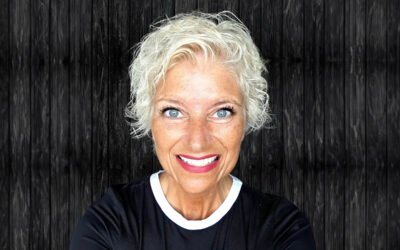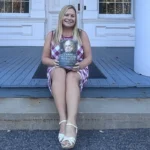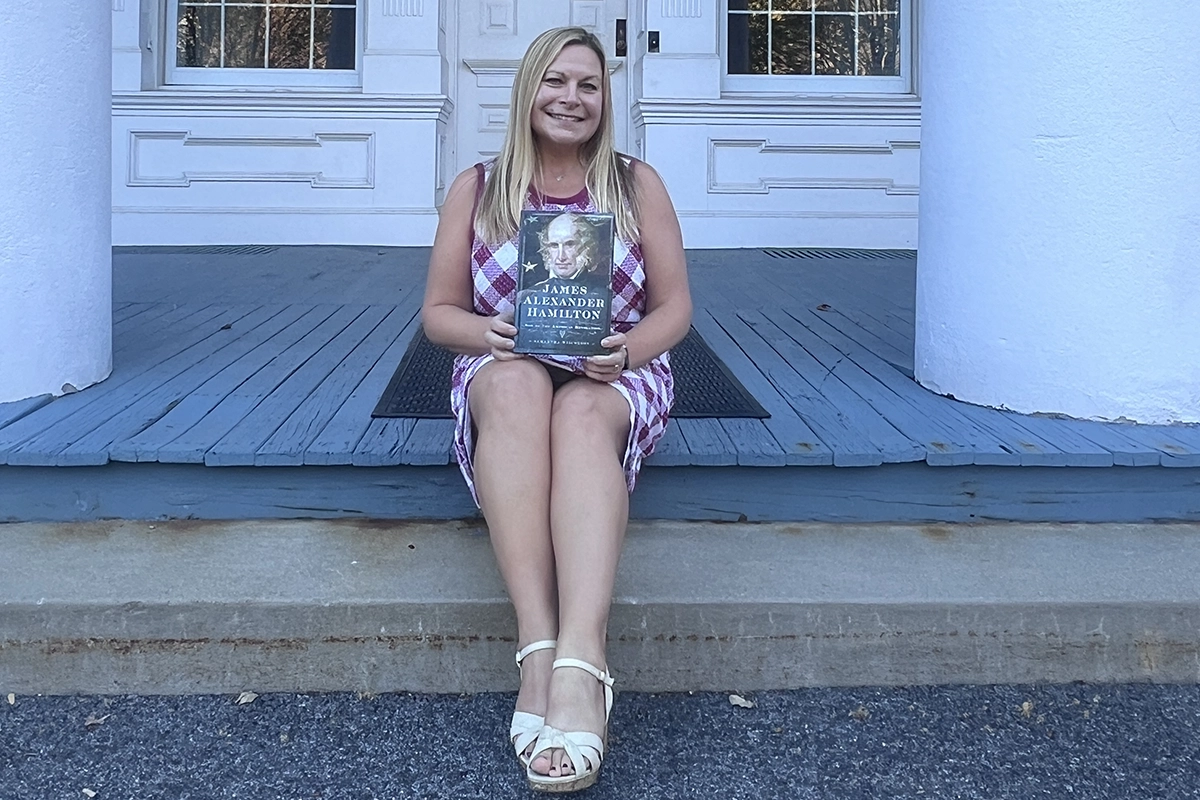Sirrah Medeiros Explores The Dark Realms Of Reality And Imagination
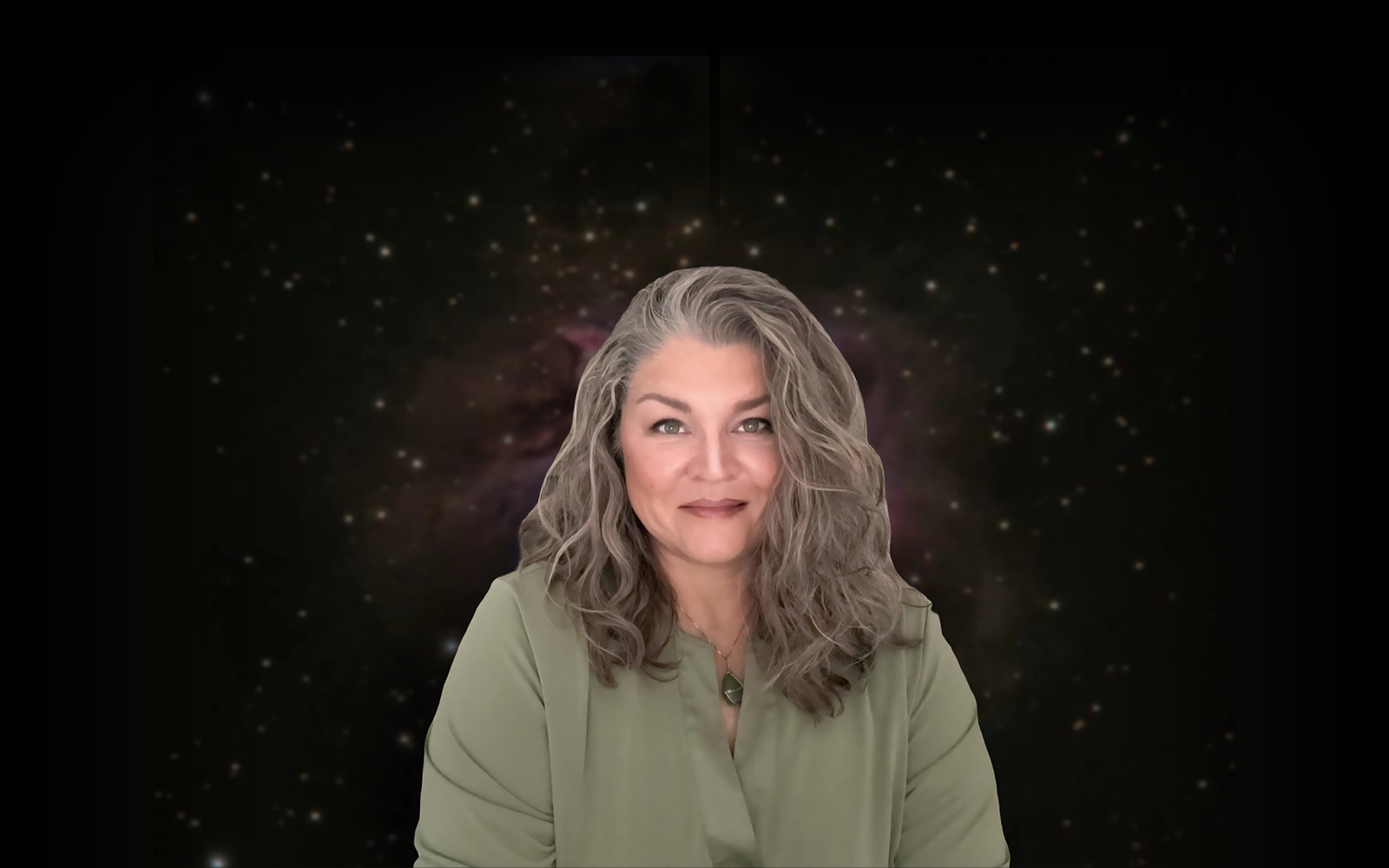
Photo: Award-winning author Sirrah Medeiros, the visionary behind Secrets of Mother and The Haunted Zone, reshaping the landscape of horror and dark fantasy fiction.
Celebrating Stories Of Women Military Veterans
Sirrah Medeiros discusses her award-winning books, anthologies, creative process, military influences, LGBTQ+ advocacy, and how her editorial expertise drives impactful horror, dark fantasy, and thriller narratives.
Sirrah Medeiros stands as a beacon of storytelling brilliance, a masterful force in blending horror, dark fantasy, and thriller genres. An award-winning author, editor, anthologist, and Editor-in-Chief of Tundra Swan Press, Medeiros has carved a unique niche in the literary world, crafting tales that intertwine vivid imagination with profound emotional depth. With a steadfast dedication to her craft and an unyielding passion for advocacy, she weaves narratives that resonate with authenticity and explore the darkest corners of human experience.
As readers dive into “Secrets of Mother,” the third entry in her award-winning Cristiane Bradford series, or the gripping standalone novella “The Malediction Plague,” they encounter characters meticulously layered with complexity and nuance. Medeiros doesn’t just write stories—she breathes life into her worlds, immersing readers in vivid landscapes fraught with suspense, horror, and humanity’s inherent contradictions.
Beyond her own formidable creations, Medeiros champions diversity and inclusivity in literature. From highlighting voices of women military veterans in “The Haunted Zone” anthology to amplifying queer narratives in “Don’t Ask, Ghosts Tell” alongside horror luminary Vince A. Liaguno, she brings fresh perspectives to the forefront, enriching genre fiction with vital and often underrepresented insights.
What solidifies Medeiros as not only a literary powerhouse but also an inspirational figure is how she channels her background—Marine Corps veteran, environmental management advocate, and LGBTQ+ ally—into her work. Her disciplined approach, combined with a profound understanding of humanity’s trials and tribulations, allows her to create worlds that are both unsettling and deeply compelling.
Sirrah Medeiros captivates readers with her mesmerizing storytelling, creating deeply emotional, haunting tales that redefine horror and dark fantasy genres.
In this exclusive interview, Sirrah Medeiros shares her journey as a storyteller, invaluable insights into her creative process, and thoughts on how her editorial acumen shapes her craft. Whether you’re a devoted fan of her novels or an aspiring writer seeking wisdom, this conversation is certain to inspire, enthrall, and emphasize why Sirrah Medeiros belongs among the luminaries of contemporary fiction.
Secrets of Mother, the latest main entry in the Cristiane Bradford series, delves deeper into maternal themes. How did you develop Cristiane’s emotional arc in this book?
Children sense when their parents aren’t truthful, honest, or completely present. In relation to the character dynamics in Secrets of Mother, Cristiane’s anxiety manifests because the relationship with her mother holds a secret at its core. That secret displayed in ways she could not understand—distance, conflict, and loneliness. Hiding a portion of herself, kept Beatrice from forming a foundational bond with Cristiane, and that lack of closeness grew into anxiety and insecurity which Cristiane carried throughout her high-school years, illustrated in the prequel, The Emerald Curse, and most of her college experience. Once the secret is resolved, both characters learn not only how to trust and interact together, but to grow as confident individuals.
“Write what makes you uncomfortable—what unsettles you. First, frighten yourself. Then, write it realistically onto the page.” – Sirrah Medeiros
The Malediction Plague is a standalone novella released in 2024. What unique narrative or thematic challenges did writing that plague-centered story present?
This story was fun to write. A thematic challenge I worked through was the psyche of the main character. He was raised by a father and grandfather who towed the line of nazi ideology. Yet, his mother was empathetic and cautioned him not to take the paternal creed at face value, but to question everything and reach his own conclusions. I had to research history in order to meld the egotistical, nazi-driven thinking with the scientist who is searching for an answer to a perceived problem. The character is ill-advised by his thoughts and internal dialog as he pursues a course of action any rational person would find abhorrent. Yet, as you follow the story, readers grasp that he has not lost his grip on morality all together. However, curiosity has a firm hold, which he indulges in horrific detail. Writing that character complexity was a challenge, but I believe it comes through to readers.
As editor of The Haunted Zone anthology, what criteria guided your selection of stories by women military veterans?
First, the authors had to be military veterans (or active duty) who identified as women. As the anthology was my first, and a passion project to highlight that demographic in the horror writing community, the initial criteria also narrowed the submission pool to a manageable level I could work through myself. Selection was based on the writer crafting a unique well-written story while remaining unified in tone to the overall theme. Selected stories reflect a vast array of haunting horrors from women’s perspectives, such as loss, assault, war, trauma, and psychological horror.
You and Vince A. Liaguno are co-editing Don’t Ask, Ghosts Tell. How is its focus different from The Haunted Zone, and what fresh voices are you highlighting?
Don’t Ask, Ghosts Tell released in June 2025, my second anthology as an editor and publisher. Vince A. Liaguno’s experience in the horror community as a writer, editor and anthologist was invaluable as we made our selections. Our focus was on the LGBTQ+ horror authors as book sales support the Modern Military Association of America, which provides assistance and advocacy to LGBTQ+ military members, veterans, and their families. The title is a play on the United States legislation Don’t Ask, Don’t Tell, that was repealed in 2011. However, the issue is relevant today, more so than expected when I mapped out the idea in 2023. We wanted the collection’s focus to highlight the horrors and struggles people in the queer community may face or try to suppress depending on surroundings, societal pressure, and circumstances. Manifestations of grief, guilt, terror, PTSD, and other similar emotions are represented in the collection. Their stories’ ghosts. Yet, truths always surface.
Along with many award-winning authors, we have amazing fresh voices in horror, such as May Walker, Amanda Nevade DeMel, and M. Edusa. Keep an eye on these newly published authors. They have much to offer.
Your background as a Marine Corps water purification specialist is unique. How has that shaped the realistic details or discipline in your horror and fantasy scenes?
My active military service was just over four years, but fueled a lasting interest in environmental and water quality issues that led to an environmental management degree. The structural foundation and discipline elevated by military service assisted in focus and drive throughout my life. However, it is the more than 25 years of education, travel, and life experiences—including a love of research and science, an inquisitive mind, and exposure to various cultures—that have profoundly influenced my writing, equipping me to create richly detailed fictional worlds.
As Editor-in-Chief at Tundra Swan Press, how does your editorial perspective feed back into your own writing process and world-building?
As an editor, I evaluate pacing, clarity, and emotional reckoning. That’s made me more proficient in finding structural weaknesses early in my work. When I am worldbuilding, I focus on what details serve the story, rather than simply adding lore for lore’s sake. I ask myself, would I accept this if someone submitted it to me? That question keeps my scenes focused and immersive rather than indulgent.
Being an editor has made me sensitive to what’s missing—whether it’s a gap in logic, emotional arc, or world rules. I use that skill when building my own fiction. I identify areas readers will instinctively question or want to explore further. Instead of patching over those gaps, I turn them into situations that pull readers deeper into the story.
Your works often bridge horror, dark fantasy, and thriller genres. How do you balance genre expectations while maintaining your distinct authorial voice?
Having a clear understanding of genres and subgenres is key to properly categorizing work and meeting reader expectations. My stories usually convey morals, virtue, or character growth amidst eerie settings, suspense, darkness, and persuasive characters. First, I write what interests me rather than following trends. Often, thrillers are a mainstream take on horror. As I steer toward crime thrillers, humanity’s darkest and their victims, it’s still horror. Dark fantasy simply involves weaving horror elements into the fantasy story arc, taking readers into or around the abyss as spells are cast and dragons slain.
What single piece of advice would you give aspiring authors, particularly those drawn to horror and dark fantasy fiction?
Write what makes you uncomfortable—what unsettles you. First, frighten yourself. Then, write it realistically onto the page. Your voice isn’t going to appeal to everyone, but written authentically and with your own sense of genuine darkness, discomfort, or curiosity woven into the story, the reader will sense that and stay drawn to your work. A unique twist on age-old genre tropes is what will make your story stand out.
Editor’s Note
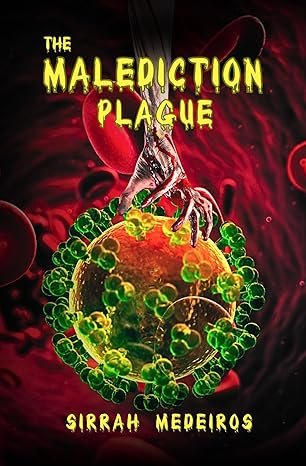
Sirrah Medeiros crafts chilling tales where science, madness, and human flaws collide. Known for her gripping, thought-provoking narratives, she explores the dark consequences of ambition, ego, and the human psyche.
The Malediction Plague follows Dr. Leon Fleischer, a brilliant scientist whose experiments unleash a devastating plague, transforming humans into zombie-like creatures. Torn by personal heartbreak and haunted by paternal expectations, Leon grapples with guilt, ego, and responsibility. As chaos spreads, he must confront his inner demons—and the fate of humanity.

